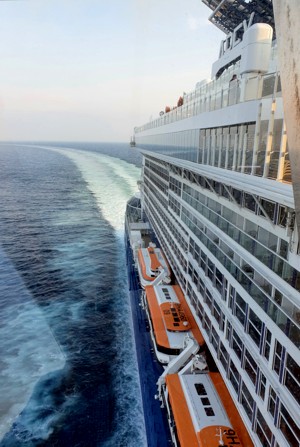
On the dockside at Rønne were around a dozen wind-turbine nacelles. From a distance they look quite small - until you see a car pass one, like a little beetle (look at the relative size of the diggers).
These are very big conventional (geared - indirect drive) units (note the oil coolers on the backs) destined for off-shore wind farms. As this is Denmark, I assumed that they are Vestas V174-9.5 MW units for installation off the coast of Germany, for either the Baltic Eagle or Arcadis Ost 1 project (link on line: Vestas Offshore).
Looking up these huge machines led me to a small holiday diversion: Could wind power really be less expensive than other sources of energy, as repeatedly claimed by the Australian Shadow Minister for Climate Change and Energy, Chris Bowen?
On-line, I discovered that the Arcadis Ost 1 wind-farm, under construction, has a projected project cost of 570 million Euros and will have a capacity of 257MW (approx. 2.2 $/W of installed capacity).
The Baltic is a great place for a wind-farm, with ample wind and shallow water, well away from those annoying people who complain about: the noise; bird strikes; and their appearance. Yet, near enough to German markets and the grid to minimise energy losses and additional grid infrastructure. But is it cost effective?
Wind has an Achilles-heel: the capacity-factor, the proportion of the time the wind is blowing, this seldom reaches 50% even in the Baltic (more typically around 30%).
Except for solar (that doesn't operate at night for some reason) this is significantly lower than any other commercial energy source. To rely on it for more than about 30% of a region's electricity thus requires some means of expensive, potentially inefficient, electricity storage (like batteries of pump-storage losing 15% to 50% of the energy initially collected) that can easily double the capital cost.
In Germany (2021) wind provides less than a fifth of electricity generation. This means Fossil fuels (mostly coal) (44%); Nuclear energy (11.8%); Solar (8.5%); other renewables (hydro, biomass etc. totalling 11.8%); and other non-renewables (4.4%) fill the gaps.
If you've travelled in Germany and seen all the wind-farms I bet you thought wind provided a lot more than 19% of the electricity?
As anyone who reads other articles on this website knows, I am an advocate of nuclear power. So, I wondered how much nuclear electricity costs per Watt of installed capacity.
On-line I discovered that the Barakah Nuclear Power Plant, currently under construction in the UAE, that has a capacity of 5,600MW has a project cost of $US24.4 billion (4.36 $/W) and the new Shin-Kori units 3 and 4 under construction in South Korea with a capacity of 3,000MW has a project cost $6.3 billion (2.1 $/W). The latter is very much in the same ball-park as the Baltic Eagle and Arcadis Ost 1 windfarms. But these are base load and, in addition, can anticipate seasonal; weekly and hourly demand fluctuations. They do not require additional capital expenditure on energy storage or suffer the consequential losses and inefficiencies.
Notwithstanding this debate, in most of the world, it seems, Europe is out of step: there is still just one, on-going, low-cost choice to provide baseload electricity; and that's fossil fuels (mostly coal and gas).
The construction cost, per unit of generating capacity, of off-shore wind is currently almost eight times that of an equivalent thermal station. For example: the new Patratu coal-fired plant in India has a generating capacity of 4,000MW at a construction cost of US$1.16 billion or about 29 US cents per Watt). But then comes the ongoing cost of the fuel.
Nevertheless, there continue to be hundreds of brand-new coal-fired stations under construction worldwide.
According to New Scientist (issue 3384, 30 April 2022), construction of new coal-fired stations is progressing unabated: "The global figure is barely changed from the 181 GW that was under construction in 2020". In 2021, 176 gigawatts of coal-fired capacity were under construction in 20 countries, predominantly in Asia (led by China and India).
There are even more gas fired generators. Why else is the price of coal and gas at record levels? It is not just due to sanctions on Russia. Demand for fossil fuels is ever increasing.
The obvious alternative to fossil fuels is nuclear, yet, as Britain has found with the latest project, it's so bound-up in regulations and protests that it's very much quicker, and initially cheaper, to install new fossil-fuelled generation. And to hell with the climate impact.
Were wind and solar cheaper sources of electricity, per MWh produced, demand for steaming coal, gas and oil would soon fall. But they are not and it hasn’t. Don't fall into the trap of comparing the lowest bids on the energy market with the actual cost of energy overall (I go into this at length elsewhere see: How does electricity work? - The Australian National Electricity Market).
Check it out yourself, compare your electricity bill now with one from a decade ago, when the proportion of renewables was lower. Compare electricity prices in South Australia (with 39% wind) with those in the rest of Australia or Denmark (with 43% wind) with the rest of Europe. Both 'enjoy' the highest prices in their region.
It’s the price we must pay to bring down carbon emissions but let’s not coat it in 'alternative facts' (Mr Bowen).
Here endeth the lesson.

fossil fuelled electricity on Bornholm - even in Denmark
Enough of the hobby-horse. Back to Rønne.

